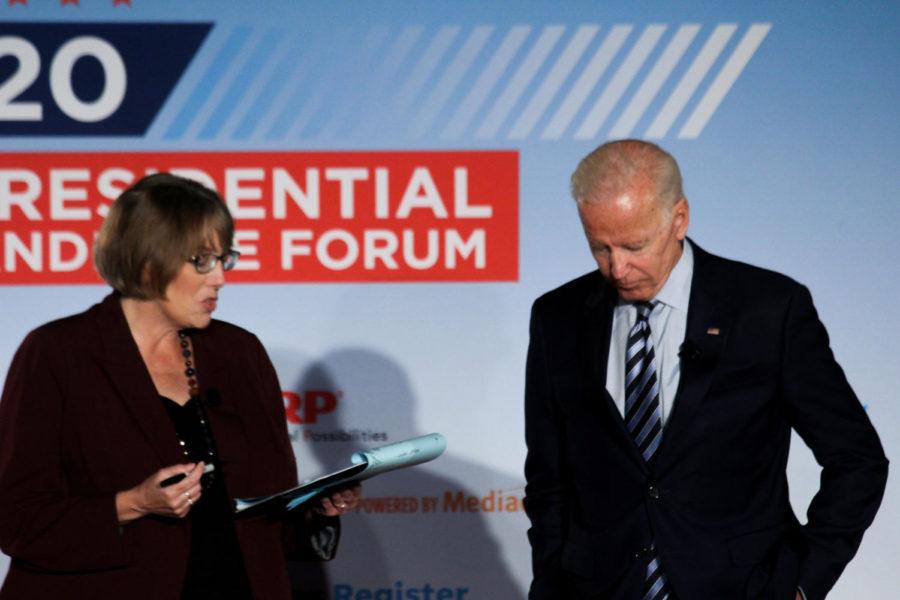Is Joe Biden still the Democratic frontrunner?
Presidential candidate and former Vice President Joe Biden answers a question from moderator Kathie Obradovich at the 2020 Presidential Candidate Forum, hosted by AARP Iowa and the Des Moines Register. The event was held on July 15 at the Olmsted Center at Drake University.
July 16, 2019
Former Vice President Joe Biden leads the pack of Democratic presidential candidates, for now.
Biden is the frontrunner in most polls still — in the RealClearPolitics (RCP) average of national polls, he holds a 12.8% lead over his nearest rivals: Sen. Elizabeth Warren and Sen. Bernie Sanders, who are tied at 15% each.
Mack Shelley, professor and chair of the political science department, said Biden is still at the top, “but just barely now.”
Shelley added the race is still “volatile,” but with some separation among a set of candidates.
“I suppose it depends on who’s in high-single digits or something in double digits. I think that qualifies you to be a frontrunner right now. … There’s four or five people,” Shelley said. “[Biden] can claim to be a frontrunner, but [he was] really badly hurt by the first debate.”
In the wake of the first Democratic presidential debates, Biden declined 5% in the RCP average of polls.
Four candidates hit double-digit support in the average as of July 16:
-
Biden at 27.8%
-
Warren at 15%
-
Sanders at 15%
-
Sen. Kamala Harris at 13.4%
Biden’s candidacy holds some structural advantages in terms of who supports him. The former vice president has strong support among older voters, who historically have a much higher turnout rate in elections than younger voters.
In the most recent publicly available opinion poll that broke down candidate support by age group, Biden has the support of 22% of Democratic voters overall, but that rises to 30% of voters 45-64, and 28% of those 65 or older.
Shelley said voters in those age cohorts are “risk averse.”
“They really don’t want to take a chance on ‘Medicare for All,’ because they’re afraid it would destroy what they’ve become used to,” Shelley said.
Sanders, who supports Medicare for All, has the support of 10% of voters aged 45-64 and just 4% among those 65 or older.
“Generationally, that’s kind of where [Biden] is by definition. … He kind of looks the role for AARP-type members,” Shelley said.
During the 2016 Iowa caucuses, people older than 45 represented 64% of caucus-goers, according to a CNN entrance poll.
However, Shelley said leading in the polls this far out from the first chance Democratic voters have to choose their nominee — the Iowa caucuses 202 days away — is “not terribly” important.
“[Biden] has separation by a little bit,” Shelley said.
At this point in the 2016 Democratic primary, eventual Democratic nominee Hillary Clinton had a more than 40% lead over runner-up Sanders.
Nevertheless, it remains possible for someone not currently as high in the polling averages to gain ground and replace Biden at the top.
“Somebody else, who either falls out of favor with the Democratic electorate … or someone who just doesn’t perform well — like Biden in the first debate — that costs them a lot,” Shelley said. “It’ll be difficult for someone to get up to Biden’s level, but it’s not impossible.”
The next chance Democrats will have to take their message to voters and try to gain their support will be the debates later this month in Detroit.
The Democratic National Committee (DNC) will announce the qualified candidates Wednesday. CNN and the DNC will announce which candidates will be on the debate stage each night on Thursday.
The debate will be broadcast live at 7 p.m. Central on CNN from Detroit.







